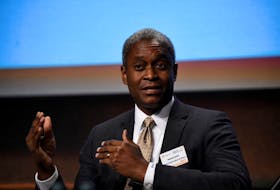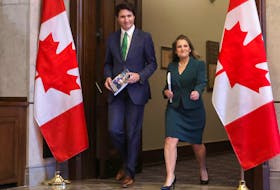
In nearly 30 years as a journalist I’ve met people who have jobs that I envy — jobs I’d jump at in a heartbeat.
Dave Lane is not one of those people.
As chair of the city’s finance committee, the St. John’s councillor is very much at the pointy end as the city moves towards presenting its budget for 2019 on Dec. 10.
Balancing my own household budget fills me with abject terror, so the idea of trying to balance a $306-million budget that directly affects hundreds of thousands of people boggles the mind.
It’s a harder task when the city is facing a budget shortfall, as it is now.
No one wants their taxes to go up. No one wants municipal services cut. Some people, if given the choice, might choose one of those over the other but it’s not going to win you any popularity contests. So where do you find the balance?
Recently there’s been a bit of good news — the projected shortfall has been reduced, from $12 million to $10 million. The city ended up with a surplus of $3 million from 2017 and is using that and some of a reserve fund to pay down the $32.8-million pension debt. That will knock just over a million dollars a year (including interest) off the city’s bottom line in debt-payment savings.
Good news, but not enough to remove the spectre of increased taxes.
And with only two months until the budget comes down, there’s not a lot of time to come up with a way to balance the budget — as the city must do by law — without resorting to a tax increase.
Program reviews say, ‘Where can I find a million bucks? Where can I find $500,000.’ Now it’s like, ‘How can we improve this?’ That’s going to change the culture at city hall and it’s reflective of a change of culture, and that’s ultimately I think what people are looking for. They want to know their tax dollars are being spent wisely.”
Coun. Dave Lane
But in talking to Lane, there are some positives for those of us watching how the city spends our money.
The city has been actively looking for ways to save money for some time.
A line-by-line program review was launched after the 2016 budget, which both raised taxes and cut some programs and services. That led to $13 million in savings, Lane says.
But more importantly, the review was one of the catalysts for wider-scale change at city hall.
“What we’ve done is we’ve implemented a standardized continuous improvement program that’s built for large organizations,” Lane said. “The thing about continuous improvement, though, is that we hope and expect cost cuts to come out of it, but that’s not what we’re looking for directly. Program reviews say, ‘Where can I find a million bucks? Where can I find $500,000.’ Now it’s like, ‘How can we improve this?’ That’s going to change the culture at city hall and it’s reflective of a change of culture, and that’s ultimately I think what people are looking for. They want to know their tax dollars are being spent wisely.”
The day after I sat down with Lane to talk about the budget, the city held its last public engagement session, part of a series of meetings and online submissions looking for public advice on how to deal with the shortfall and ways the city spend our money more wisely in future.
By Monday, all the submissions received by the city will be condensed into a “What We Heard” document and released for public review. It’ll also be dissected by council.
Having that conversation with the public is perhaps the biggest win of this year’s budget process, according to Lane.
And the suggestions from the public haven’t simply been “don’t raise my taxes,” or “don’t cut my programs” – although they were popular themes.

Will those suggestions make it into to budget? Maybe.“I feel that the dialogue has become a lot more — I was going to say intelligent, which is true — but it’s more robust,” Lane said. “A lot of the suggestions we’re getting throughout this process — which I think it’s the best engagement process we’ve ever done on one of the most important documents — they’re all thoughtful or at least there’s a majority of thoughtful suggestions and input.”
“I can say that a lot of them are totally going to be influencing the next two and three budgets,” Lane said.
The bigger impact will likely come after the budget as the city takes some of those suggestions and puts them into practice — things like rolling out an energy efficiency strategy to deal with the expected major increases in city electrical bills.
Things like maybe selling Mile One, as some have suggested.
The city has already tasked a consultant to look into operations at Mile One. That study will also examine the financial pros and cons of selling the stadium.
Watch this space on that topic.
Mark Vaughan-Jackson is The Telegram’s business editor. He can be reached via email at [email protected] or on Twitter @Telebookmark.
Related column:

![["St. John's City Hall. — file photo"]](https://saltwire.imgix.net/st-john-s-city-hall-2235000.jpg?cs=srgb&fit=crop&h=568&w=847&dpr=1&auto=compress%2Cformat%2Cenhance)







